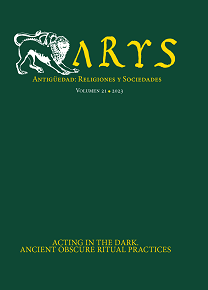The Darkness and the Oracle of Trophonius in Lebadea
Abstract
In his Description of Greece, Pausanias gives a detailed account of the workings of the oracle of Trophonius, the hero responsible for the construction of the temple of Apollo at Delphi, which was located in Lebadea (Boeotia). According to Pausanias, before accessing the oracle, visitors had to perform a complex nocturnal ritual that prepared them for contact with the hero. This chapter will analyse the role of darkness in the different stages of the ritual and how it could influence the oracular perception of the consultant. A comparative study will be carried out between the preparation rituals of the oracle’s visitor and Greek funerary rituals. The similarities between the two types of ceremonies suggest that the consultant had to prepare themselves in order to symbolically enter the afterlife and perform the nekya with the hero.
Downloads
References
Alvar Nuño, Antón, Alvar Ezquerra, Jaime & Woolf, Greg (eds.) (2021). Sensorium. The Senses in Roman Polytheism. Leiden: Brill.
Bonnechere, Pierre (1998). La scène d’initiation des Nuées d’Aristophane et Trophonios. Nouvelles Lumières sur le culte lébadéen. Revue des études grecques, 111.2, pp. 436-480.
Bonnechere, Pierre (2003a). Trophonios de Lébadée. Cultes et mythes d’une cité béotienne au miroir de la mentalité antique. Leiden & Boston: Brill.
Bonnechere, Pierre (2003b). Trophonios of Lebadea. Mystery Aspects of an Oracular Cult in Boeotia. En Cosmopoulos, 2003, pp. 169-192.
Bonnechere, Pierre (2007). The Place of the Sacred Grove (alsos) in the Mantic Rituals of Greece. The Example of the Oracle of Trophonios at Lebadeia (Boeotia). En Conan, 2007, pp. 17-41.
Boutsikas, Efrosyni (2017). The Role of Darkness in Ancient Greek Religion and Religious Practice. En Papadopoulos & Moyes, 2017, pp. 43-63.
Brandt, J. Rasmus & Iddent, Jon W. (eds.) (2012). Greek and Roman Festivals. Content, Meaning and Practice. Oxford: Oxford University Press.
Chaniotis, Angelos (2018). Nessun Dorma. Changing Nightlife in the Hellenistic and Roman East. En Chaniotis & Pascale, 2018, pp. 1-49.
Chaniotis, Angelos & Pascale, Derron (eds.) (2018). La nuit. Imaginaire et réalités nocturnes dans le monde gréco-romain. Genéve: Fondation Hardt.
Clark, Raymond J. (1968). The Manner of His Revelation. Transactions and Proceedings of the American Philological Association, 99, pp. 63-75.
Conan, Michel (ed.) (2007). Sacred Gardens and Landscapes. Ritual and Agency. Washington DC.: Dumbarton Oaks Research Library and Collection.
Cosmopoulos, Michael B. (2003) (ed.) Greek Mysteries. The Archaeology and Ritual of Ancient Greek Secret Cults. London: Routledge.
Ekroth, Gunnel (2002). The Sacrificial Rituals of Greek Hero-Cults. Liège: Presses universitaires de Liège.
Ekroth, Gunnel (2007). Heroes and Hero-Cults. En Ogden, 2007, pp. 100-114.
Ekroth, Gunnel (2012). Pelops Joins the Party. Transformation of a Hero-Cult within the Festival at Olympia. En Brandt & Iddent, 2012, pp. 95-137.
Felton, Debbie (2007). The Dead. En Ogden, 2007, pp. 86-99.
Garland, Robert (1985). The Greek Way of Death. London: Duckworth.
Gordillo, Rocío (2021). Day and Night in the Agones of the Roman Isthmian Games. En Alvar Nuño, Alvar Ezquerra & Woolf, 2021, pp. 160-176.
Hägg, Robin (ed.) (1999). Ancient Greek Hero Cult. Proceedings of the Fifth International Seminar on Ancient Greek Cult, organized by the Department of Classical Archaeology and Ancient History (Göteborg, 21-23 April 1995). Stockholm: Svenska Institutet i Athen.
Hernández de la Fuente, David (2008). Oráculos griegos. Madrid: Alianza.
Johnston, Sarah Iles (1999). Restless Dead. Encounters between the Living and the Dead in Ancient Greece. California: University of California Press.
Jones, Chistopher (2010). New Heroes in Antiquity. From Achilles to Antinoos. Cambridge & London: Harvard University Press.
Kurtz, Donna C. & Boardman, John (1971). Greek Burial Customs. Ithaca & New York: Cornell University Press.
Martín Hernández, Raquel (2005). La muerte como experiencia mistérica. Estudio sobre la posibilidad de una experiencia de muerte ficticia en las iniciaciones griegas. Ilu. Revista de Ciencias de las Religiones, 10, pp. 85-105.
Moyes, Holley, Rigoli, Lillian, Huette, Stephanie, Montello, Daniel R., Matlock, Teenie y Spivey, Michael J. (2017). Darkness and the Imagination. The Role of Environment in the Development of Spiritual Beliefs. En Papadopoulos & Moyes, 2017, pp. 85-104.
Ogden, Daniel (2001a). The Ancient Greek Oracles of the Dead. Acta Classica, 44, pp. 167- 195.
Ogden, Daniel (2001b). Greek and Roman Necromancy. Princeton: Princeton University Press.
Ogden, Daniel (ed.) (2007). A Companion to Greek Religion. Malden, MA & Oxford: Blackwell.
Papadopoulos, Costas & Moyes, Holley (eds.) (2017). The Oxford Handbook of Light in Archaeology. Oxford: Oxford University Press.
Schachter, Albert (1981). Cults of Boiotia. Vol. 1: Acheloos to Hera. London: University of London.
Ustinova, Yulia (2009a). Cave Experiences and Ancient Greek Oracles. Time and Mind. The Journal of Archaeology, Consciousness and Culture, 2.3, pp. 265-286.
Ustinova, Yulia (2009b). Caves and the Ancient Greek Mind. Descending Underground in the Search for Ultimate Truth. Oxford: Oxford University Press.
Copyright (c) 2023 Rocío del Carmen Gordillo Hervás

This work is licensed under a Creative Commons Attribution-NonCommercial-NoDerivatives 4.0 International License.
Authors retain the copyright of their texts and all publishing rights without restrictions.
Since 2021, the documents have been licensed under the Creative Commons 4.0: Attribution–Non-Commercial–No Derivative Works (CC BY-NC-ND 4.0). Previous documents are licensed under Creative Commons 3.0: Attribution–Non-Commercial–No Derivative Works (CC BY-NC-ND 3.0).
Funding data
-
Ministerio de Ciencia, Innovación y Universidades
Grant numbers PGC2018-096500-B-C31 -
Ministerio de Ciencia e Innovación
Grant numbers PID2021-125226NB-C22




